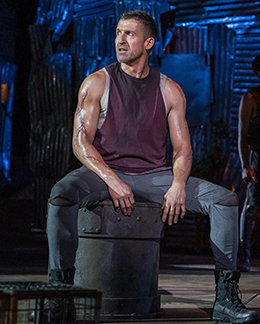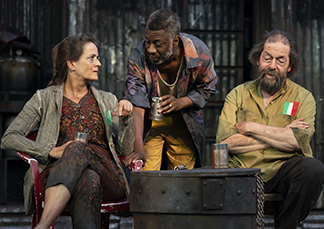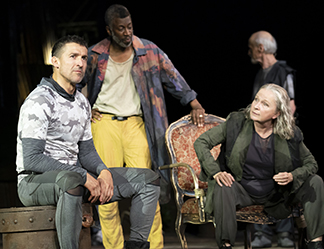By Lucy Komisar

Jonathan Cake is terrific as Caius Martius, the Roman general who is a master of war and an abject failure at politics. The one demands a tough hierarchical leader in a system where everyone below must follow commands.
The second requires a connection to the public and the assertion, whether it is true or not, that their voices matter. Failure to recognize that can bring defeat as bloody as a loss in battle.
Director Daniel Sullivan does well to give a modern cast to this story, which of course has been repeated through ages, as military heroes turned tyrants are overthrown by the people.
Caius Martius returns from battle to a city where the tin shacks inhabited by ordinary people look like the favelas and slums of countries where the wealth has been looted by the rich. (Set by Beowulf Boritt.) Indeed, the people cry, “We will have grain,” and “The source of our misery is their abundance.”

Caius Martius has just defeated the Volscians, who, curiously are called the Volskies, which makes one think of the Ruskies, the current chosen enemy of the American ruling class.
The people want change. They will choose him to be consul. They will call him Coriolanus, after his victory. But he has a problem.

He “loves the common people,” he just doesn‘t want to talk to him. He is told that is the price of the consulship they want to give him. Speaking like a demagogic politician, instead of dealing with their concerns, he pontificates, “I have wounds to show you.”
That doesn‘t work. The people declare, “He did mock us.” The tribunes of the people (the very fine Enid Graham and Jonathan Hadary) begin to organize the population in opposition, warning that he will take their liberty.
Meanwhile, Caius Martius declares about them, “The tribunes of the people…of the common man…I do despise them. They plot to curb me.”

His mother, Voluminia (the excellent and fierce Kate Burton) desperate, even screaming, tries to get him to assuage the people. But his fury pulsates; he will not come down from his imperial perch.
The macho Coriolanus is, in fact, so loyal only to himself that he flees to the enemy leader Tullus Aufidius (a powerful Louis Cancelmi) and offers to help him defeat Rome.
The message is clear: beware double-talking leaders who think they don’t have to do what the people want and need, just show their wounds and expect a thank you for your service. They are swarming in this political season.
Coriolanus. Written by William Shakespeare, directed by Daniel Sullivan. Opened Aug 5, 2019, closes Aug 11, 2019. Running time 3 hours. 8/5/19. Also on NY Theatre Wire.


The first three paragraphs of Lucy Komisar’s review of “Coriolanus” are a brilliantly brief and incisive description of the difference between the military and civilian worlds.